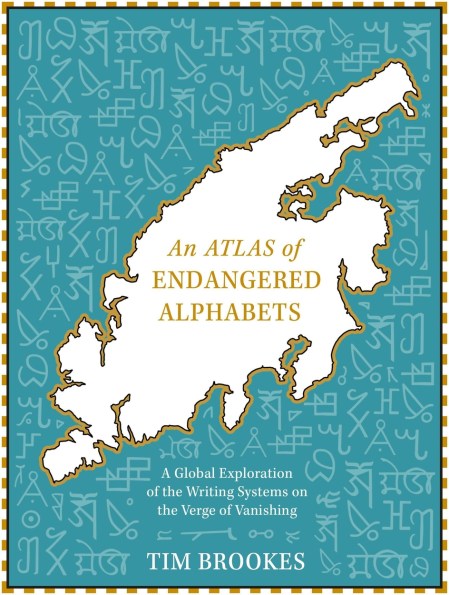A global exploration of the many writing systems that are on the verge of vanishing, and the stories and cultures they carry with them.
If something is important, we write it down. Yet 85% of the world’s writing systems are on the verge of vanishing – not granted official status, not taught in schools, discouraged and dismissed.
When a culture is forced to abandon its traditional script, everything it has written for hundreds of years – sacred texts, poems, personal correspondence, legal documents, the collective experience, wisdom and identity of a people – is lost.
This Atlas is about those writing systems, and the people who are trying to save them. From the ancient holy alphabets of the Middle East, now used only by tiny sects, to newly created African alphabets designed to keep cultural traditions alive in the twenty-first century: from a Sudanese script based on the ownership marks traditionally branded into camels, to a secret system used in one corner of China exclusively by women to record the songs and stories of their inner selves: this unique book profiles dozens of scripts and the cultures they encapsulate, offering glimpses of worlds unknown to us – and ways of saving them from vanishing entirely.
If something is important, we write it down. Yet 85% of the world’s writing systems are on the verge of vanishing – not granted official status, not taught in schools, discouraged and dismissed.
When a culture is forced to abandon its traditional script, everything it has written for hundreds of years – sacred texts, poems, personal correspondence, legal documents, the collective experience, wisdom and identity of a people – is lost.
This Atlas is about those writing systems, and the people who are trying to save them. From the ancient holy alphabets of the Middle East, now used only by tiny sects, to newly created African alphabets designed to keep cultural traditions alive in the twenty-first century: from a Sudanese script based on the ownership marks traditionally branded into camels, to a secret system used in one corner of China exclusively by women to record the songs and stories of their inner selves: this unique book profiles dozens of scripts and the cultures they encapsulate, offering glimpses of worlds unknown to us – and ways of saving them from vanishing entirely.
Newsletter Signup
By clicking ‘Sign Up,’ I acknowledge that I have read and agree to Hachette Book Group’s Privacy Policy and Terms of Use
Reviews
This impressive volume, organised geographically, sets out information on 80 writing systems in danger of being lost or replaced by majority scripts like Latin, Arabic, Cyrillic or Devanagari. It includes history and current state of each one, samples of use, and pointers to sources of further information. It is an invaluable guide for anyone interested in this aspect of threatened cultures around the world.
An Atlas of Endangered Languages is a voyage of visual expression, which illuminates the spiritual bond between languages and their writing systems. It reminds us of the culture, ecology, and mythic resonance in every glyph. Read it. You'll end up curious about what makes us different, proud of what makes us the same, and eager to explore what will no doubt feel like a larger, more lovely world.
An Atlas of Endangered Alphabets could perfectly well be bought as a "coffee table book" (get it on your festive wishlist now!) - it looks beautiful, and you can dip in whenever you feel like it for a nugget of fascinating information. But it is much more than that. This is a call to action: these rich cultural traditions won't be around much longer if their users continue to struggle against political oppression, language loss and lack of resources - so we must all act while we can, however we can.
Writing is art, language, design, and engineering rolled into one. Every script tells the story of the linguistic and material worlds in which it thrives. Tim Brookes' journey through this rich terrain is a global tour de force just when these sumptuous scripts are at their most vulnerable. His work is an invitation to pick up your pen, brush, or quill and fill your page with joyous swirls.
This book ... is a brilliant achievement.

